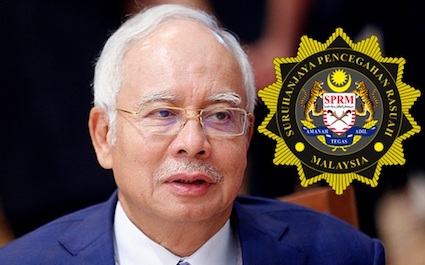Go ahead, reopen 1MDB probe, says Najib

(FMT) – Former prime minister Najib Razak says he has no qualms about the 1MDB probe being reopened but does not want it to become a “fault-finding mission”.
Speaking to reporters at the Parliament lobby today, the Pekan MP said if the Public Accounts Committee (PAC) wanted to reopen the probe, it should do so in order to seek the truth.
“I have no objections if they want to reopen investigations. But don’t let it be done in a mode of fault finding.”
He said the PAC had already spent six months looking into the matter and concluded that he had done nothing wrong as prime minister and finance minister.
He noted that there had also been opposition members in the PAC at the time.
“Now they have the mandate to govern the country. They should focus on efforts to develop the country and find new ways in terms of ideas and sources of revenue to improve the economy and help the people.”
Earlier today, Finance Minister Lim Guan Eng filed a motion in the Dewan Rakyat for investigations into the 1MDB scandal to be reopened.
The Bagan MP also asked for all related information to be made public.
The motion, which is currently at number five in the Dewan Rakyat’s order paper, is expected to be tabled tomorrow.
Najib said under the new administration, the people had been deprived of rights which were agreed on by the previous government.
“BR1M was reduced, civil servants’ wage increment has been halted, 17,000 contract officers were dismissed and fishermen’s subsidies were removed.
“There is so much that the people could have received, and I made sufficient allocations for this in the budget,” he said.
He said it had always been his wish to reduce corporate tax, which currently stands at 24%.
“Singapore’s is at 17%, and Indonesia is said to be reducing theirs to 17% as well. If Malaysia remains at 24%, competitiveness will be affected,” he said, adding that investors would want to invest in countries with low tax.
He also claimed that money would flow illegally to countries with lower corporate tax rates in the form of transfer pricing.
“The sales and services tax will not be able to stop the illicit outflow because it is not transparent. This is why, when we introduced the goods and services tax (GST), the illicit outflow was significantly reduced.
“Many do not understand this, that the GST is able to curb incidents of transfer pricing which favours multinationals,” he said.

